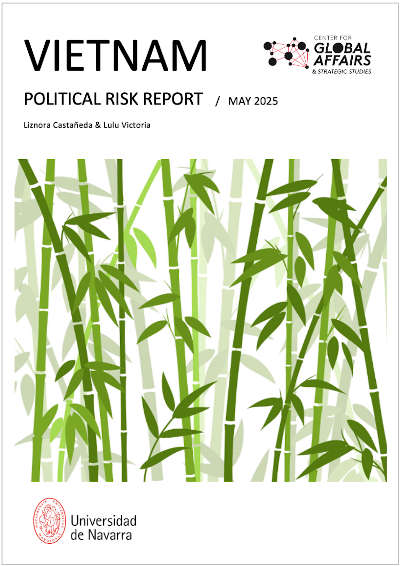In the image
Bamboo drawing [FreePick]
EXECUTIVE SUMMARY
The purpose of this political risk report is to assess whether Vietnam is a suitable destination for investors. Through an analysis of its economic, political, and energy landscapes, it establishes the risks posed to the stability in the country.
Regarding the economic forecast, the report finds that Vietnam’s GDP will keep growing above world average. Before the trade tariffs threshold announced by the Trump Administration, the economy was expected to grow 6.1% in 2025 and 6% in 2026; after the US threats, estimations reduced the growth to 5.2% this year and 4% the next. The assumption of this report is that Washington and Hanoi will possibly find an accommodation in the months ahead; a quick agreement could bring the growth near to the first figures, although some impact will be registered. Additionally, Vietnam’s economy will diversify in the medium and long term, with a focus on high-tech sectors and further potentializing its manufacturing industry, driven by a projected increase in foreign direct investment in the short term. Growth will also be pushed forward by Vietnam’s reforms in SOE, streamlining state budget and managed by strict transparency standards. Vietnam’s long-term growth will depend on boosting productivity and leveraging its demographic window of opportunity.
In relation to the political outlook, internal party dynamics are likely to remain stable in the short and medium term, favored by projected economic growth. Factionalism is unlikely to represent a risk to changes in policy direction, as the Party’s legitimacy will continue to fundamentalism itself in economic growth. The anti-corruption campaign has and will continue to become the new business standard for internal and foreign business operations, whilst not presenting an inherent risk to foreign investors.
In the case of resource prospects, Vietnam is likely to develop its rare earth sector in the medium and long term, propelled by investments and an increase in international demand, but will fall short in rivaling China’s dominance. Energy prospects will continue to see a short- and medium-term reliance on fossil fuels, but will see an important shift in its energy mix with a bigger role for renewable energy. The market of renewables is also likely to develop in the medium and long term, with wind and solar energies representing the biggest areas of interest for investment. Food security outlooks are an area of moderate uncertainty, as though Vietnamese farmers have managed to adapt to these consequences in the short term, water stress depends largely on China’s continued interference regarding Mekong River water flows.


